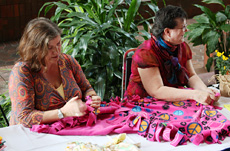Needles and Threads fashions hope for cancer patients
 |
| From left: Sheila Cisko and Kathy Johnson demonstrate fleece blanket making at the Fermilab Wellness Fair on Sept. 23. |
When Kathy Johnson was diagnosed with cancer in 2009, it was easy for her to become discouraged. But the oncology center where she was treated gave her a scrap of cheer: handcrafted items donated by volunteers. She received a pretty shawl, a tote bag that came in handy for her chemo visits and a variety of hats that kept her coworkers guessing what she’d wear each day.
“It’s amazing what those gifts can do for your spirits,” she said. “I thought that we at the laboratory could do that for people, too.”
Thus, the Needles and Threads volunteer project was born.
For the past year, Johnson has scoured the web for user-friendly patterns and ideas for caps, scarves, bags, blankets and pillowcases that Fermilab volunteers of all skill levels could make and donate to oncology centers. Whether participants prefer to knit or crochet, quilt or sew, Johnson and other experienced crafters will provide the instruction.
“If you can tie a knot, you can contribute,” said Fermilab employee Sheila Cisko, a longtime friend of Johnson’s who will assist with the project.
After the group's inaugural meeting on Oct. 20, the Needles and Threads volunteers will form smaller groups to plan their own projects and schedule meetings both on and off the Fermilab campus. The organizers hope that the variety of crafts will attract participants from every skill level – and even some men. The program will also accept yarn and fabric donations.
Johnson hopes to focus on practical items for cancer patients. Chemo caps, for instance, can be made in a variety of styles for patients of different ages. Needles and Threads will donate the items to the organizations Haloes of Hope and ConKerr Cancer, oncology centers such as Southern Virginia Regional Medical Center, Massey Cancer Center of Southern Virginia, and Fermilab’s own Neutron Therapy center.
“By making these items for cancer patients, we can let them know people are thinking about them, and maybe relieve some of their suffering,” Cisko said.
The first meeting will take place at noon on Oct. 20 in the Abacus Conference Room, WH4E.
-- Sara Reardon
|